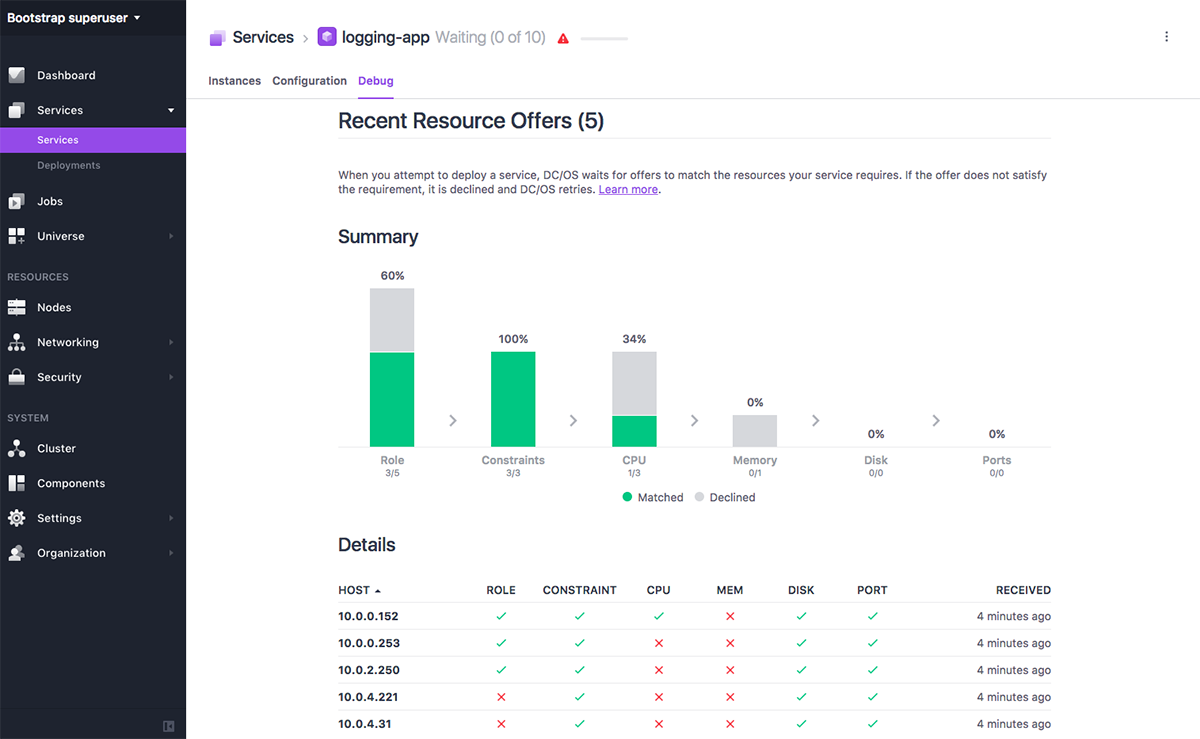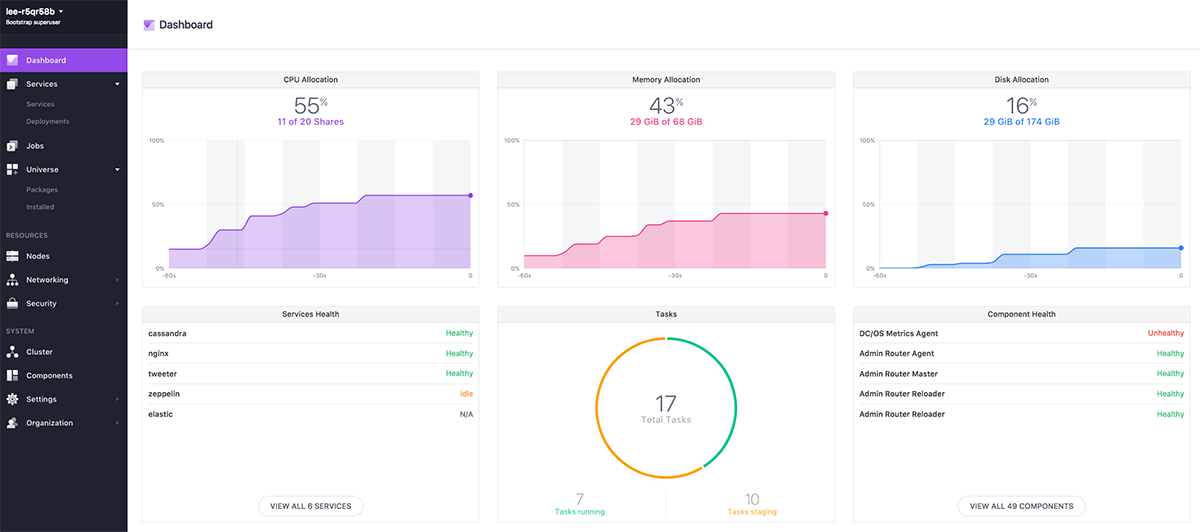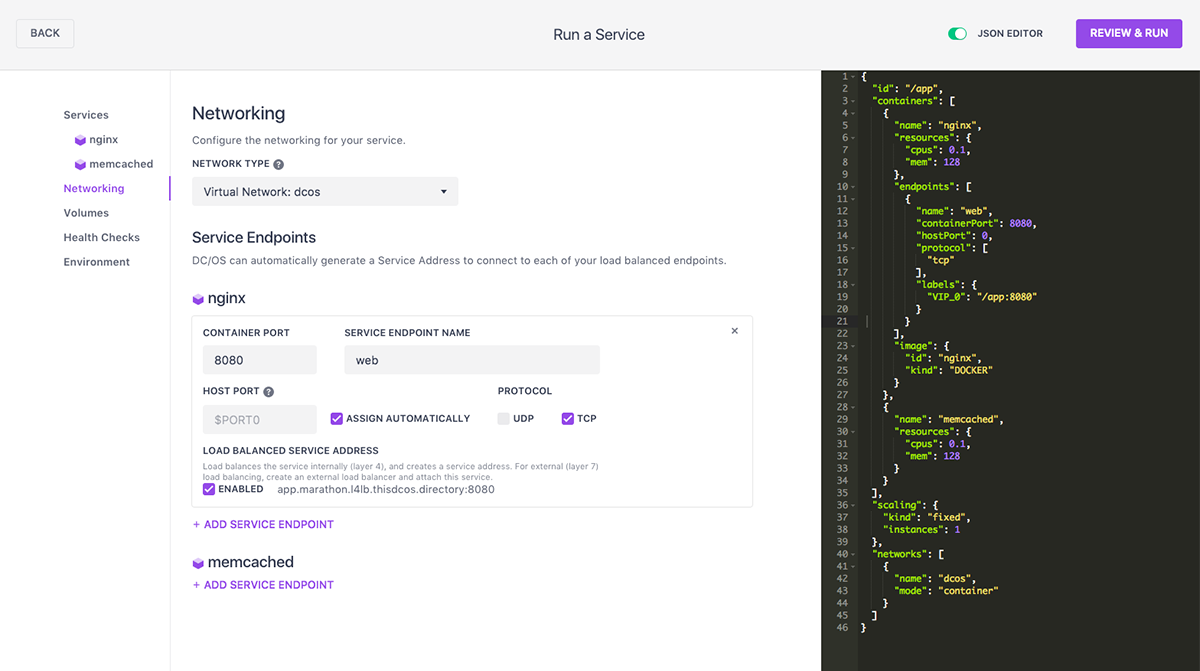DC/OS 1.9 includes many new capabilities for Operators, and expands the collection of Data and Developer Services with a focus on:
- Tools for Production Operations - Monitoring and troubleshooting for distributed apps.
- Broader Workload Support - From traditional apps to machine learning.
- New data and developer services.
Contents
What's New
Apache Mesos 1.2 and Marathon 1.4 integrated
- Marathon 1.4.5 release notes.
- Apache Mesos 1.2.1 CHANGELOG.
Container Orchestration
Added support for pods, GPUs, and made significant scalability improvements.
Pods
Multiple co-located containers per instance, scheduled on the same host. For more information, see the documentation.
GPU
- Leverage GPUs to run novel algorithms.
- Because DC/OS GPU support is compatible with nvidia-docker, you can test locally with nvidia-docker and then deploy to production with DC/OS.
- Allocate GPUs on a per container basis, including isolation guarantees
For more information, see the documentation.
DC/OS Monitoring and Operations
Remote Process Injection for Debugging
The new dcos task exec command allows you to remotely execute a process inside the container of a deployed Mesos task, providing the following features.
- An optional
--interactiveflag for interactive sessions. - Attach to a remote pseudoterminal (aka PTY) inside a container via the optional
--ttyflag. - Combine the
--interactiveand--ttyflags to launch an interactive bash session or to runtopand see the resource usage of your container in real time.
For more information, see the documentation for the debugging documentation.
Logging
Stream task and system logs to journald by setting the mesos_container_log_sink install-time parameter to journald or journald+logrotate. This allows you to:
- Include task metadata like container ID in your queries to more easily locate the logs that you want.
- Use new DC/OS CLI commands
dcos node loganddcos task logDC/OS CLI commands to query the logs. You can also make requests directly against the new Logging API. - Set up log aggregation solutions such as Logstash to get logs into their aggregated storage solutions.
For more information, see the documentation.
Metrics
- Node-level HTTP API that returns metrics from frameworks, cgroup allocations per container, and host level metrics such as load and memory allocation.
- StatsD endpoint in every container for forwarding metrics to the DC/OS metrics service. This service is what exposes the HTTP API.
- Any metric sent to STATSD_UDP_HOST/PORT is available in the HTTP API
/container/<container_id>/appendpoint.
For more information, see the documentation.
Tool for Troubleshooting Service Deployment Failures
The new service deployment troubleshooting tool allows you to find out why your applications aren’t starting from the GUI and CLI.

Improved GUI
New look and feel and improved navigation.

Usability improvements to the service create workflow.

Networking Services
- CNI support for 3rd party CNI plugins.
- Performance improvements across all networking features.
Other Improvements
DC/OS Internals
- Update DC/OS internal JDK to 8u112 for security fixes.
- Update DC/OS internal Python from 3.4 to 3.5.
- The
dcos_generate_config.sh --aws-cloudformationcommand will now determine the region of the s3 bucket automatically, preventing region mistakes. - Added the
dcos_add_user.pyscript, which you can use to add or invites users to a DC/OS cluster from the command line. For more information, see the documentation. - Added
dcos-shellwhich activates the DC/OS environment for running other DC/OS command line tools.
Expanded OS Support
- If you install DC/OS 1.9 using the GUI or CLI installation methods, your system will be automatically upgraded to the latest version of CentOS.
- CoreOS 1235.12.0.
Expanded Docker Engine Support
- Docker 1.12 and 1.13 are now supported. Docker 1.13 is the default version.
Upgrades
Improved upgrade tooling and experience for on-premise installations. Upgrades now use internal DC/OS APIs to ensure nodes can be upgraded with minimal disruption to running DC/OS services on a node. The upgrade procedure has also been simplified to improve user experience.
For more information, see the documentation.
Known Issues and Limitations
- DCOS_OSS-691 - DNS becomes briefly unavailable during DC/OS version upgrades.
- DCOS-14005 - Marathon-LB does not support pods.
- DCOS-14021 - Task logging to journald disabled by default, so task logs will continue to be written to their sandboxes, and logrotated out. The
- DCOS task logcommand will work as it did before. - DCOS-14433 - The Universal container runtime does not support Azure cloud with Ubuntu.
- DCOS-16350 - You cannot retrieve metrics emitted by an application over statsd unless they are sent in a single batch. If statsd metrics are sent as a sequence of messages, only the most recently received metric will be available from the
/appendpoint. DCOS-16737 - You cannot generate and publish AWS Advanced Templates. When running the command
dcos_generate_config.sh --aws-cloudformationwith GovCloud credentials you will see an error similar to this:$ ./dcos_generate_config.ee.sh --aws-cloudformation ====> EXECUTING AWS CLOUD FORMATION TEMPLATE GENERATION Generating configuration files... Starting new HTTPS connection (1): s3.amazonaws.com aws_template_storage_region_name: Unable to determine region location of s3 bucket testbucket: An error occurred (InvalidAccessKeyId) when calling the GetBucketLocation operation: The AWS Access Key Id you provided does not exist in our records.- Marathon-7133 - Marathon application history is lost after Marathon restart.
Issues Fixed since 1.8
- CORE-735 - Large node count leads to failed overlay config and failed replog recovery.
- DCOS-9149 - Missing Timeout for Spartan fetching DNS Exhibitor data.
- DCOS-9754 - beam.smp consumes inordinate amount of CPU.
- DCOS-9776 - Race in DeploymentPlan.
- DCOS-10089 - Network tab in UI doesn't show the assigned IP.
- DCOS-13228 - Layer 4 load balancer is not working with Docker bridge mode.
- DCOS-13359 - Backends are not removed from VIP table when killed.
- DCOS-13367 - ZooKeeper logs grow unbounded and will cause master node disks to fill up.
- DCOS-13400 - Layer 4 load balancer cannot handle multiple protocols with the same VIP.
- DCOS-13448 - Missing explicit file descriptor limits for DC/OS services.
- DCOS-13672 - Mesos reports over allocated CPU during DC/OS upgrade.
- DCOS-14228 - Disabled schedules keep firing in jobs.
Issues Fixed since 1.9.0
- CORE-1062 - Chronos launching a Docker container causes Mesos agent to crash.
- DCOS_OSS-720 - Cryptographic Cluster ID is longer than ~50 characters.
- DCOS_OSS-743 - The prerequisite install script breaks Docker 1.13 on CentOS 7.3.
- DCOS_OSS-790 - The pid isolator is disabled for containers launched via the UCR.
- DCOS_OSS-796 - Navstar unhealthy in 1000 node cluster.
- DCOS_OSS-804 - Log messages do not contain the originating module or function name.
- DCOS_OSS-812 - Minuteman crashes for non-TCP protocol.
- DCOS_OSS-876 - Unable to designate whether GPUs (or any other type of resource) should be considered a "scarce" resource in their cluster or not. For more information, see the
gpus_are_scarceparameter for config.yaml. - DCOS_OSS-947 - When upgrading from 1.8 to 1.9,
/etc/profile.d/dcos.shsymlink is not updated. - DCOS_OSS-1064 - Unable to configure Exhibitor to use HTTP basic auth.
- DCOS_OSS-1102 -
dcos-signalsends the packaging version of installed package rather than packaging version. - DCOS-13590 - Mesos DNS compresses various fields in records that should not be compressed (e.g., SRV's Target field).
- DCOS-14302 - Chronos requires the hostname inside
/etc/hosts. - DCOS-14750 - Cannot see or download the logs when using the GUI installer.
- DCOS-15317 -
myidis missing from the ZooKeeper logs. - DCOS-15653 - Log rotation happens 256 times more often than intended.
- OPS-578 - DC/OS CentOS 7 AMI has broken hostname config.